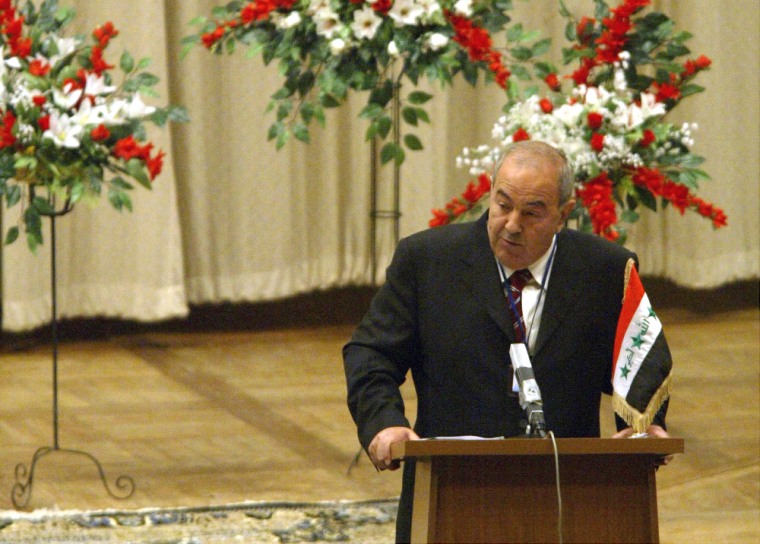Kurdish and Shiite politicians said Thursday they made headway in solving new disagreements in their deal to form a coalition government, nearly seven weeks after Iraqis took to the polls, but it remained unclear when that new government would be announced.
The talks came after Iraqi legislators were sworn in Wednesday as members of the 275-seat National Assembly, vowing to uphold freedom and democracy two years after the fall of Saddam Hussein. Many of the new deputies wore traditional robes trimmed in gold, and mingled with austere Shiite clerics in black robes and turbans. Other men wore tan or gray suits, while nearly all the 85 women lawmakers wore headscarves.
Elected on Jan. 30, when insurgent attacks killed more than 40 people, the assembly ended its first session with an oath to protect Iraq’s “federal democratic system” and “public and private liberties.”
Insurgents, hoping to disrupt the ceremony, fired seven mortar rounds in quick succession at the convention center that temporarily houses parliament in the heavily fortified Green Zone. U.S. Apache attack helicopters hovered overhead.
Oil issue?
Thursday’s discussions focused on whether to allow the Kurdish peshmerga militia to remain in Kurdistan as part of the Iraqi security services and army, and on setting a timetable for the Kurds to assume control of oil-rich Kirkuk and allow the return of its nearly 100,000 refugees. Those conditions were included in an interim law that serves as a preliminary constitution.
“Negotiations were very constructive and the differences in the interim law and peshmerga were solved. We have agreed that some peshmerga will join the Kurdistan police and some will be part of the Iraqi army, with the same equipment and salaries and take orders from the defense ministry in Baghdad,” Azad Jundiyan, a spokesman for the Patriotic Union of Kurdistan, told The Associated Press.
That is the political party of Jalal Talabani, who probably will become Iraq’s next president.
But Jundiyan added that announcing a new government could come after Kurds celebrate their new year next week.
“I think that the new government will be announced on March 26 after the end of Nowruz,” he said.
The interim constitution has no set time limit on forming the government after the National Assembly convenes. But once it elects a president with a two-thirds majority, a prime minister must be chosen within two weeks.
There was no immediate comment on the date from Shiite politicians.
Shiite optimism
Earlier, a member of the Shiite-dominated United Iraqi Alliance said there was agreement on issues such as the peshmerga, and more talks would be held.
“The army units in Kurdistan will be mixed and follow the orders of the central government. As for the police force they will be formed from the people of Kurdistan,” Ali al-Dabagh said.
On Wednesday, the deputies failed to set a date to reconvene, did not elect a speaker or even nominate a president and vice president — all of which they had hoped to do. Instead, the session was spent celebrating the moment, and the enormous obstacles Iraq has overcome.
Absent from the assembly hall were large numbers of Sunni Arabs, believed to make up the core of the insurgency. Sunnis, who were favored under Saddam Hussein’s regime even though they make up only about 20 percent of Iraq’s population, mostly stayed away from the national elections — either to honor a boycott call or because of fears of being attacked at the polls by militants.
President Bush called the session a “bright moment” for Iraq but added there was no timetable for withdrawing U.S. troops.
“We’ve always said this is a process, and today was a step in that process. It’s a hopeful moment,” Bush said Wednesday in Washington.
Also Thursday, insurgents fired a mortar at a central Baghdad hotel housing Western journalists, but hotel employees said the round caused minor damage and no injuries.
Police near the southern city of Basra discovered the bodies of three men and one woman whose hands were bound and who were shot in the head. Danish troops blocked off the road around the area, and the identities of the four was unclear.
Meanwhile, outgoing U.S. Ambassador John Negroponte flew out of Iraq on Thursday after a nearly nine-month stint to return to the United States, the U.S. Embassy said. Charge d’affaires James F. Jeffrey will assume responsibility for the vacant post temporarily.
Negroponte arrived in Iraq as ambassador on June 30, 2004, just hours after the handover of sovereignty to Iraq’s government. His replacement has not been announced.
Negroponte has been nominated by Bush to be the U.S. director of national intelligence.
Danish Prime Minister Anders Fogh Rasmussen traveled to Iraq on Thursday and met with political leaders, including Ibrahim al-Jaafari, the Shiite expected to be Iraq’s next prime minister. It was not known if he would travel to Basra, in southern Iraq, where Denmark has 501 troops stationed as part of the U.S.-led coalition.
